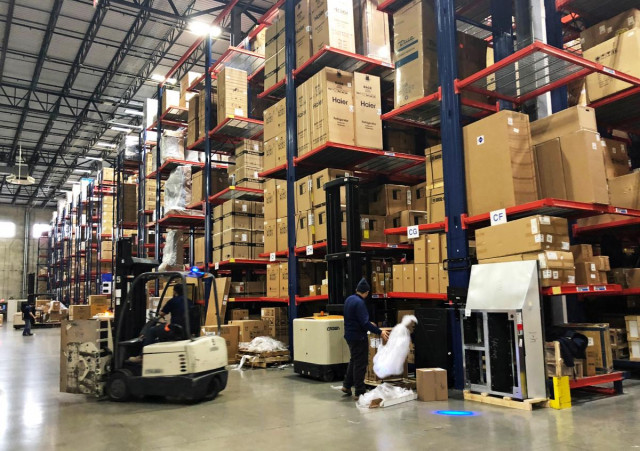Trump tariff war with China sends US retailers on buying binge
Warehouses throughout US are at record capacity with Chinese imports of all kinds

Warehouses throughout US are at record capacity with Chinese imports of all kinds. PHOTO: REUTERS
Warehouses throughout the United States are at record capacity with Chinese imports of all kinds - microwaves, vacuum cleaner filters, swimwear and furniture - stacked to the ceiling, according to Magnus, who heads the National Customs Brokers and Forwarders Association of America, whose members work with over 250,000 importers and exporters.
"My office is right on a land border and I can see the trucks just coming across non-stop from my window," Magnus said, referring to her birds eye view from Champlain, New York of trade on the border between Canada and the US. "Even with Christmas, it's been notably busier this week and last week than it's ever been before."
China-US surplus hits record, adding fuel to trade war
She is one of over a dozen customs brokers, retailers, vendors, analysts and supply chain experts who told Reuters that retailers have been stockpiling inventory from China to avoid higher tariffs that may kick in next year.
The buying binge is also evident in recent data from the National Retail Federation (NRF) and Hackett Associates, which show imports at major US retail container ports surged 13.6% to a record 2.04 million containers in October. This helped push the US trade deficit with China to a record high.
Stores including Walmart Inc, Target Corp, TJX Companies Inc and Macy's Inc raced to buy Chinese products in September, the sources said, the same month the Trump Administration announced 25% tariffs would go into effect on January 1 on $200 billion of Chinese imports.
The US and China have since agreed to a 90-day trade war truce until March 2, but supply chain firms and vendors said this has not slowed buying or forward orders because the tariffs could still be hiked.
"We have been tactical and pulled some orders forward," Walmart spokeswoman Marilee McInnis told Reuters in an emailed statement.
Other major retailers, including Target, TJX and Macy's would not comment on the part tariffs played in their approach to buying inventory this year. The strategy could mean heavy discounts for shoppers next year if retailers are stuck with an overhang of unsold merchandise.
Global trade war: costs and consequences
Already, it has driven up transportation and warehousing costs, which is adding pressure to quarterly results for retailers, according to the sources. The question is whether stores absorb the added costs or pass them on to customers.
"More likely than not, the retailer will take them so the consumer doesn't have to," said NRF Head of Supply Chain and Customs Policy Jonathan Gold.
Gold said he "definitely" expected higher inventory and logistics costs to continue into the first quarter as retailers rush to meet the March 2 deadline.
The NRF works with about 18,000 member retailers. "A lot of people are competing for space right now so you're going to have some retailers hurt as a result."
The surplus signals a stark change from last year, when retailers and department stores were ordering less products and in smaller batches to keep inventory costs down. Retailers have for years been struggling with declining holiday foot traffic and larger inventories weigh on balance sheets.


















COMMENTS
Comments are moderated and generally will be posted if they are on-topic and not abusive.
For more information, please see our Comments FAQ